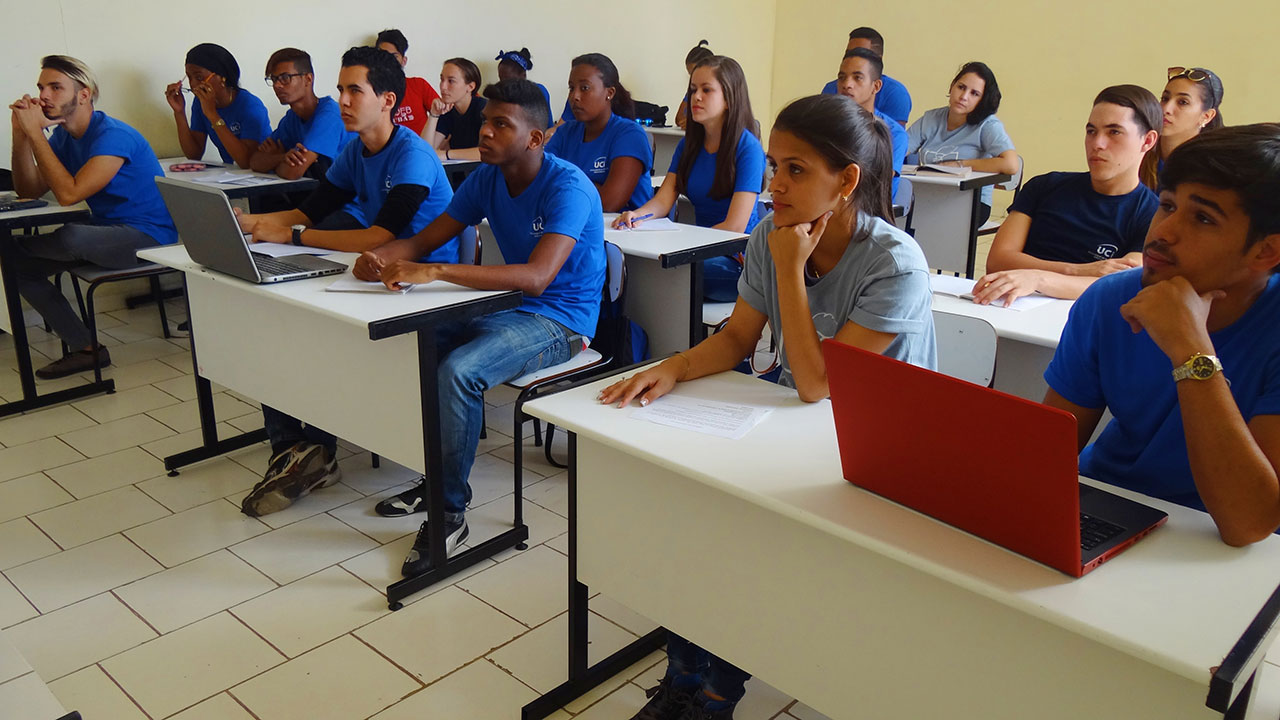
Academic Services
They are offered for different periods according to the level of instruction of the students and the objectives to be reached.
Research projects are directly linked to software development centers and teaching departments.
We train integral professionals, endowed with abilities supported by a scientific and dialectical - materialistic conception of the world; capable of responding to the objectives of the nation, international trends and professional problems in the area of Information Science and Computing.
The training model is based on the principle of José Martí and Fidel Castro that proposes the study-work link, which is achieved by incorporating students into real research and development projects. In this way, it is structured into two very well-defined cycles: a basic period of integration and another of professional practice as the central axis of the curriculum.
COMPUTER SCIENCE ENGINEERING
The Computer Science Engineering career trains comprehensive and highly qualified professionals, whose function is associated with the development of the Informatization of the Cuban Society from three important angles: the development of the national software industry, the digital transformation of organizations and the necessary support for the maintenance of information technology infrastructures.
The academic training is similar to other related careers, highlighting its theoretical-practical preparation in Software Engineering and Programming, as well as in other disciplines such as Mathematics, Computational Intelligence and Digital Systems.
The distinctive feature of this engineering, from the curricular point of view, is the high degree of integration of the training process with practical activity. Curricularly, the professional roles that the student must perform in the Research-Development projects to which they are linked from the second year of the degree are defined.
The University has a network of internationally certified Software Development Centers, which develop computer solutions for Cuba and other countries. Their involvement in real software development projects is direct to these centers.
This training model promotes the natural insertion of the graduate into the world of work and stimulates their projection towards postgraduate training.
Accreditation: Career Certified by the National Accreditation Board
Degree: Computer Science Engineer
Duration: 4 years
Modality: Face-to-face, in regular daytime Course and Course by meetings.


BIOINFORMATICS ENGINEERING
The purpose of the Bioinformatics Engineer's profession is the computational treatment (acquisition, storage, organization, processing, analysis and visualization) of data, information and knowledge of chemical-biological and medical origin, which includes processes and nanoscopic structures associated with life, from research, production or services in the biomedical, agricultural and biopharmaceutical areas.
The basic curriculum of this Engineering includes subjects from the disciplines: Mathematics, Applied Mathematics, General Physics, Biology, Chemistry, Computer Science, Bioinformatics and Professional Investigative Activity.
The investigative-labor activity is based on the development of the discipline of Professional Investigative Activity, which constitutes the Main Integrating Discipline. It is executed in a distributed way and with the guarantee of the incorporation of students to real productive projects. From the third year, students spend a considerable part of the school period located in centers that act as teaching units, directly linked to the real processes of research-production-services.
Accreditation: Career approved by the Ministry of Higher Education
Degree: Bioinformatics Engineer
Duration: 4 years
Modality: Face-to-face, in a regular daytime course.
CYBERSECURITY ENGINEERING
The Cybersecurity Engineer will have as its object of profession the management of cybersecurity of organizations, from the establishment, implementation, operation, monitoring, review, maintenance and continuous improvement of the necessary measures for the preservation of confidentiality, integrity and availability. of the information; as well as the protection of the technologies through which this information is created, processed, stored and transmitted.
The cybersecurity engineer will be trained to perform the following tasks:
- The design of the organizations' cybersecurity system, which implies the elaboration of the computer security plan based on a risk analysis.
- The implementation of the necessary security measures to preserve the confidentiality, integrity and availability of the information.
- The configuration and administration of technical security controls such as: intrusion detection systems, firewalls, protection against malicious programs, trace analysis, cryptographic systems, vulnerability and patch management, information backup, among others.
- The analysis and processing of information relevant to the security system through the use of database management systems and event management, as well as the application of programming algorithms and artificial intelligence techniques.
- The establishment of security mechanisms in the complete cycle of the development of computer applications.
- Carrying out penetration tests (ethical hacking) to computer systems.
- Incident management through permanent monitoring of the security system and the application of computer forensic techniques, ensuring compliance with the country's regulatory framework.
Accreditation: Career approved by the Ministry of Higher Education
Degree: Cybersecurity Engineer
Duration: 4 years
Modality: Face-to-face, in a regular daytime course.
SHORT CYCLE PROGRAM IN NETWORK ADMINISTRATION AND INFORMATION SECURITY
The training program of the Higher Education level of the Short Cycle in Network Administration and Information Security trains higher level technicians whose purpose of the profession is the administration of applications and infrastructures of information networks that guarantee the Cybersecurity and Cyberdefense of the country.
The Program has great weight in practical activities both in specialized laboratories and in organizations and companies.
The base curriculum of the Senior Technician in Network Administration and Information Security includes subjects such as: Mathematics, Physics, Programming, Analog and Digital Systems, Computer Networks, Information Security, Applications and Telematic Services, Database Systems and Professional Practice. A group of optional subjects complement their training.
Accreditation: Program approved by the Ministry of Higher Education
Qualification: Higher Technician in Networks and Computer Security
Duration: 2 years
Modality: Face-to-face, in a regular daytime course.
We also offer academic services of short courses, internships, stays, training, conference cycles, teaching practices and thesis advice, all shorter modalities linked to Computer Science.
CONTACT INFORMATION
Technology Transfer Department
Postal address: Highway to San Antonio de los Baños, Km 2 ½, Torrens district, Boyeros municipality, Havana, Cuba. ZIP: 19370
Telephones: (+53) 78373880, 78373866, 78358019
Email: servicios.academicos@uci.cu

